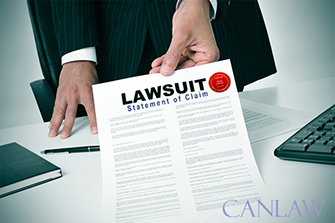 CanLaw
CanLaw
Credit Problems? How to legally reduce or eliminate all your debts.
Current as of
I'm being sued by someone in Small Claims Court. What should I do?
 WHAT TO DO IF YOU ARE BEING SUED.
WHAT TO DO IF YOU ARE BEING SUED.
YOU MUST SERVE AND FILE YOUR DEFENCE WITHIN 20 DAYS.
Here is what happens when a creditor sues you and gets a small claims court judgment against you. Creditors can make you pay the judgment and costs in full.
When a creditor sues you
If a creditor is trying to collect $50,000 or less, the case will be probably be heard in the local Small Claims Court.
You will receive a Statement of Claim
The creditor or a process server will deliver (serve) the claim in person to you or to an adult resident of your household. Don't try and pretend you were not served or try to avoid service If you try, the courts will order that you can be served by ordinary mail or some other method.
The Statement of Claim will tell you who is suing you, why they are suing, and for how much money they are suing you. It will also include brief instructions on how you must respond.
If you ignore the claim and do not respond, the court will order judgment against you automatically
You Will Be Compelled to Pay if Your Lose
After the court awards a judgment to a creditor, the creditor can take several steps to get the money that you owe:
Obtain a Judgment Debtor exam. You will be required to attend a court hearing with all your financial documents.
The creditor can question you on why you have not paid and make you reveal where your money is so they can issue a garnishee of your wages or bank accounts or accounts receivable and collect the money.
They can register a writ of enforcement with the Personal Property Registry which puts a claim on your property. When you sell, you will have to clear the claim by paying it
If you have money problems, bad credit or debts you are not paying, your
creditors can and probably will sue you to recover the money that you owe.
CAN'T PAY YOUR BILLS?
If you are not making your monthly payments, are maxed out on your credit cards and loans, you have serious money problems.
You have a bad credit rating with Trans Union and Equifax. Your credit score will be bad and this could lead to employment problems and worse.
This CanLaw section provides you with many potential solutions to help you get out of debt.
What to do if you are being sued in Small Claims Court. File a defence
Here is what happens when a creditor sues you and gets a small claims court judgment against you. Creditors can make you pay the judgment and costs in full."
Do not ignore the claim.
Take action. If you don't take action, your creditor can get a default judgment from the court. Then you will not have the chance to negotiate or to present your side of the story.
There are three actions that you can take:
1. Negotiate a settlement
Contact your creditor if you haven't already done
so. You may be able to negotiate a payment
plan that you can handle. If you and your
creditor agree to a plan, the creditor should
immediately inform the Civil Division of
Provincial Court in writing that the matter has
been settled.
2. Pay the claim.
You can pay the claim and related costs to the
court, or directly to the creditor or his
representative. Make sure you get a receipt. The
court will only accept payment by cash, certified
cheque or money order. You will not have to
appear before a judge if you choose this action.
3. File a defence.
The court documents you were served will tell you how many days you have to file a defence. It is around 20, but varies by province.
If you do not file a defence the court will award the creditor with a judgment against you.
4. What happens next?
Once you file a defence the court will hold a settlement conference and advise you of the date.
If a settlement is reached that ends the matter.
If no settlement is reached, the creditor must request a trial.
If you don't appear in court on the day of the trial, the creditor may still get a judgment against you in the full amount.
For more information please consult the CanLaw Guide to Small Claims Courts click here
A judgment is forever - - even after it is paid
A judgment appears on your credit record and will lower your credit rating and credit score.
Even after you pay the debt, the judgment record will remain on your credit record for several years.
Businesses may not be willing to give you credit if you have a judgment on your record.
